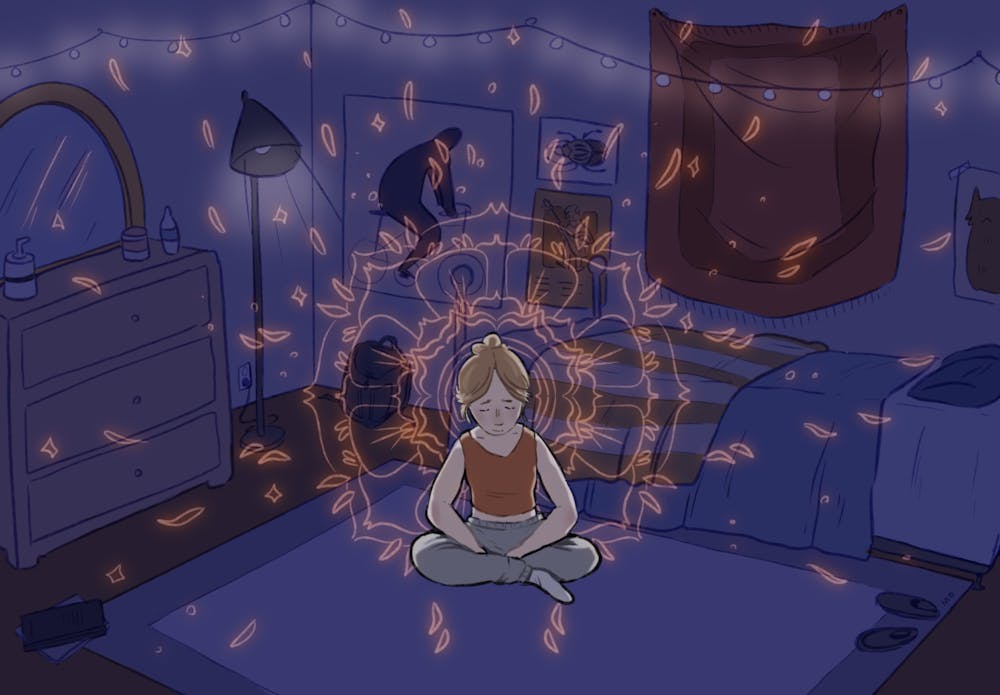College students face no shortage of stressors. Classes, assignments, jobs and friends all start to add up as the quarter progresses. The cacophony of new responsibilities, obligations and distractions are hard to work through. Sometimes the brain never quiets down; there is always something to worry about.
The American Institute of Stress found that eight out of 10 college students experience frequent bouts of stress and 61% of college students seek counseling, often for anxiety and depression. As college students, Jemma and I can concur that this holds up. We find ourselves stressing about assignments and due dates almost daily.
Meditation has become increasingly popular in American culture in recent decades. Mindfulness appears almost like a trend among some TikTok and Instagram users — Sophie is seeing more and more influencers incorporating meditation or mindfulness into their routines.
For her, meditation and mindfulness have been more influential in her life than the average person. Sophie’s father is a Buddhist. This tradition often includes the belief that life is suffering and uses mediation as a form of spiritual enlightenment.
COVID-19 played a role in the rise of meditative practices. Using data collected by Fitbit, the Global Wellness Institute said the practice of meditation rose globally during March-Sept. of 2020.
Jemma and I have never given meditation a full-hearted try. In the past, we have – and sometimes still – feel that meditation is quite daunting.
There can be many different reasons one would have this feeling. Perhaps being alone with one’s thoughts for extended periods does not sound enticing. The idea that meditation sounds hard or boring and a lack of understanding of what meditation really is can hinder one’s motivation to give it a try.
Meditation is not a new tool. It has been around for thousands of years and the concept has remained relatively the same.
“Meditation, as described in the ancient Vedic texts, is an exercise of consciousness that results in the expansion of consciousness beyond the day-to-day experience of duality,” said Hari Sharma in a writing for the National Library of Medicine.
Vedic texts refer to ancient Indian texts written in Sanskrit which are some of the oldest scriptures related to Hinduism. In Hinduism, meditation is seen as a tool to quiet the mind and dive deeper into our “Divine nature.” But there are many reasons and ways to meditate in both Buddhism and Hinduism.
“Mindfulness is paying attention, on purpose, in the present moment, with acceptance,” said Tim Burnett, a local Zen teacher.
Burnett is one of the founders and the guiding teacher of Red Cedar Zen Community and the founder and executive director of Mindfulness Northwest.
“Meditation practices are some of the tools that help to strengthen and nurture [mindfulness],” Burnett said.
Braden Untiedt, a student of Fairhaven Interdisciplinary Studies and the president of the Western Washington University Meditation Club, said there is a misconception that one will instantly feel better after meditating.
“It forces you to be honest with yourself, which can be difficult,” he said. “That also leads to development and growth.”
For some, meditation can provide a sense of peace and deep relaxation. During meditation, the feedback loop going to the deep inner self provides a feeling of calm and bliss. Meditation can aid in removing accumulated stress, which in turn can lead to improved health over time, said Sharma in his writing.
The Mayo Clinic agrees that meditation can help one keep their cool throughout the day and lower anxiety levels, as well as even improve symptoms of medical conditions such as high blood pressure.
Multiple sessions might not give someone immediate life-changing results. But just like with most habits, it takes time to reap the rewards of your efforts.
“My relationship with myself is in a much better, healthier place than it was even just a few years ago,” said Katarina Gombocz, a member of Red Cedar.
When Gombocz first became friends with Burnett, and began incorporating meditation into their life, they were working at Northwest Youth Services. Gombocz thought providing meditation and mindfulness classes for the kids could give them some peace and coping strategies.
“It really helps me come to terms with trauma stuff from when I was a kid and things that really impact our relationships with ourselves,” they said. Gombocz has been practicing Buddhist meditation regularly for about a year.
Meditation made Gombocz fully realize the extent of the shame they had been feeling. They described the feeling as a very difficult and isolating emotion.
“If anybody wants to start meditating consistently, having a teacher … is really important because they can kind of help you through that [difficult] stuff,” Gombocz said.
Some may find that meditation can also seem daunting due to the often work-focused culture we exist in.
“If you're not working, if you're not producing, then you're not valuable,” Untiedt said.
Burnett agrees and thinks that one just needs to step out of that feeling at times and meditation can assist in doing so.
Meditation is not a magic fix. Burnett still feels the pressure to constantly be productive, but the practice of meditation seeps into the rest of his life, he explained.
“I think I see [the pressure to be productive] a little more clearly. I'm a little less caught by it,” he said.
Untiedt started his meditation journey on YouTube, searching for a way to decompress after dropping out and then returning to school. He discovered how many kinds of meditation there are and now focuses on mindfulness meditation.
“The act of mindfulness is what you're shooting for when you're going into meditation,” Untiedt said.
Our own experience with meditation is minimal. Sophie has done a fair share of guided meditations on YouTube and a couple of sessions on her own, but it never stuck. Inconsistency is pretty common.
Seth Snyder, a third-year at Western’s Fairhaven College of Interdisciplinary Studies, started meditation three years ago, but only practices about once a month.
“It's about self improvement, like discipline and actually getting yourself to do these things,” he said. Snyder now attends regular Meditation Club meetings.
The most common misconception of meditation is that all you do is sit and try not to think. This is inaccurate, as some level of awareness and conscious thought is inevitable, nor would it be desirable to eliminate. The concept rather is to sit and notice one’s thoughts as an observer. Meditation is allowing yourself to breathe, relax and tune into one’s body and surroundings.
“It's nice to give yourself permission to not do anything,” Snyder said. “Especially at the end of the school day.”
Meditation is more prominent among college students than we originally thought. Western’s Meditation Club typically draws in a steady group of regulars. Some of these regulars have been experimenting with meditation on their own for a while.
“There's something about that shared experience between everybody that is very different from doing meditation by yourself,” Untiedt said. After fifteen minutes of meditation, the group shares how their experience went, describing how “deep” they were able to go that day and what they may have been thinking about.
“It has been a really nice thing to have to cap off the school day with,” Snyder said. “It's the hardest to do it on your own.”
It can be hard to get into at first but the results are irrefutable for some. Carolyn McCarthy, who teaches at Mindfulness Northwest with Burnett, has been practicing for 12 years and says it has changed the way she feels about many aspects of life for the better.
She first started the practice when she was experiencing chronic pain due to an exploded disc in her back and her mom provided her with a guided meditation recording. McCarthy said it was the only thing that provided her any relief even for a few moments. She’s stuck with it ever since.
“I get really crabby by the end of the day and my temper is shorter, I'm just less patient and less able to kind of navigate the ups and downs,” McCarthy said. “When I sit there silently for 20 minutes in the morning, the whole day goes better.”
Practicing mindfulness can affect the rest of one's life.
“If you stick with it, your brain forms different neural pathways,” Gombocz said. “It’s a very literal change that happens inside you.”
Mindfulness and meditation cannot solve all of one's problems, but taking time to observe how one is feeling and reflect without distraction gives one the tools to deal with the stress that school, relationships and life bring.
“I’m more like the me that I want to be when I practice,” McCarthy said.
For those who want to start meditating, the Western Meditation Club meets at 4:30 p.m. in the Viking Union room 464 every Tuesday and Thursday.
Sophie Bechkowiak (she/her) is writing for the opinion beat at The Front this quarter. She is in her fourth year at Western working towards a journalism news/editorial major and a philosophy minor. On her days off she enjoys thrifting, art, watching documentaries and goofing around with friends.
You can reach her at sophiebechkowiak.thefront@gmail.com.

Jemma Alexander (she/her) is a campus life reporter for The Front. She is a senior majoring in journalism new/ed and minoring in Arab American studies. When she's not doing homework, Jemma is likely working, talking loudly over movies with her roommates or dancing ’till she drops. You can reach her at jemmaalexander.thefront@gmail.com.






